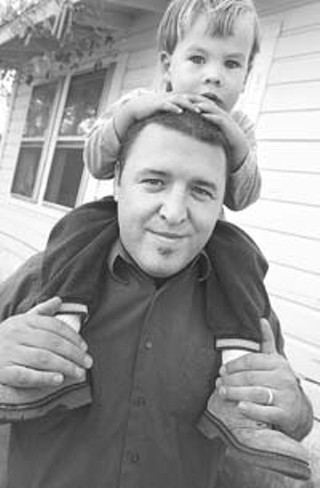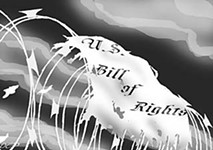Eight Years Later, Elgin Man Becomes a 'Terrorist'
A 1994 outburst lands a local man in jail -- last fall
By Lauri Apple, Fri., March 14, 2003

Until last fall, Elgin resident Andrew Bryan Lawhorn never knew that for years he'd been facing charges of making a terroristic threat. In September 2002, Elgin police arrested Lawhorn at his home for allegedly threatening to "blow up" the Wylie Municipal Courthouse nine years ago. The warrant for that crime was issued in July 1999 -- a full five years after it allegedly took place -- and only entered into the state's computer system just shortly before Lawhorn's arrest.
Recently, a Collin Co. judge dismissed Lawhorn's terroristic-threat charge, a Class B misdemeanor that carries a maximum penalty of a $2,000 fine, six months in jail, or both. Afterward, Collin Co. District Attorney John Roach told the Plano Star-Courier that Lawhorn's case was unlike any he has heard of in his legal career. "It's almost inexplicable to not have an arrest warrant issued for five years after charges are brought," Roach said.
Lawhorn's case began in late summer 1994 in the town of Wylie. While Lawhorn and several others were riding down the street in his "old and beat-up" van, a Wylie police officer pulled him over for having a broken turn signal and gave him a "fistful" of tickets. Later that day, Lawhorn called the Wylie Municipal Courthouse to get payment information regarding the tickets. Elaine Simms, the court clerk on the other end of the line, told him the broken signal would cost a couple hundred dollars. "Y'all are trying to rape me," Lawhorn recalls saying to Simms (who couldn't be reached for comment). He then allegedly said he'd "rather blow up the courthouse than pay such fines." Immediately he apologized, and when Simms asked Lawhorn if his statement was a threat, he said no. "The severity of the fines had angered me. I told her that I would pay in cash and in person to display my earnest amends."
Naturally, the state's record of the incident tells a different story. In an affidavit dated Sept. 8, 1994, Wylie police officer Gerald Jones alleges that Lawhorn told Simms, "I'll blow up that courthouse." Frightened, Simms reported Lawhorn to her supervisor, who then notified the Wylie chief of police. When Lawhorn arrived at the police station to pay his tickets, three plainclothes officers took him aside. "I told them that I believed that actual threats should be taken seriously and began pleading for forgiveness," Lawhorn says. "I reassured them that I did not intend to harm anyone ever." Apparently convinced he was telling the truth, the officers let Lawhorn go, never mentioning that he was charged with any crime.
Fast-forward to September 2002. Lawhorn had been hanging out in a neighborhood playground one Sunday afternoon with his toddler son when he spotted a group of kids vandalizing a nearby school building. Doing his Good Samaritan duty, he reported the vandalism to the local police, who arrived at the scene and took down Lawhorn's account of what he'd witnessed. Officers ran Lawhorn's information through their computer system, noticed the outstanding warrant, and showed up at his house later that evening to take him to the Elgin jail, where he spent a few hours before being transferred to county jail in Bastrop. A lawyer friend armed with bail money quickly came to the rescue, and Lawhorn was freed.
What puzzled Lawhorn was that he'd encountered law enforcement before, in 2001, when he got a traffic ticket in Elgin, and the 1999 warrant hadn't shown up. Why did it take so long for the state to arrest him? According to a DPS spokeswoman, "It could be for any reason." A spokeswoman for the Collin Co. Sheriff's Office speculated that the state "probably couldn't find him to serve the warrant," but Lawhorn was never on the lam.
For counsel at his preliminary hearing in January, Lawhorn turned to the American Civil Liberties Union, which argued that prosecuting Lawhorn eight years after the fact violated his Sixth Amendment right to a speedy trial. The judge agreed.
Last legislative session, the ACLU had unsuccessfully fought against creation of a state database collecting records of all noncriminal threats allegedly made against peace officers. The database is not open to the public; information must be sought through an open-records request. The ACLU opposed the database for many reasons, including the fact that it relies on oral evidence -- opening up the possibility that individuals, including corrupt police officers, might use it to punish their enemies, or exaggerate supposed threats. The database also lacks specific criteria regarding corroboration of evidence; local agencies make those determinations. Beverly Reeves, a manager at the state's Crime Information Bureau (part of the Crime Records Service), says written documentation must be provided before the threat is recorded in the database; anonymous tips aren't acceptable. "But I'm sure there are people who will try to get others into trouble," she said, adding that officers believe the database has been effective, even though there's "not a lot" of records in it. (Lawhorn's information couldn't have been included in the database, since his charges dated well before its creation.)
Lawhorn believes that help from the ACLU, as well as some family connections (his wife's grandfather was John Henry Faulk), were key factors in getting his charges thrown out. Still spooked by the experience, he wonders if other people are finding themselves facing similar situations. "There will be people in my shoes who don't have access to anything," he says. "Somebody could be just like me, watching a football game, and be taken away for something they said seven years ago." This week, he visited the Capitol building with other civil liberties advocates to talk to legislators about the terrorist-threat database "and other legislative threats to civil liberties."
Got something to say on the subject? Send a letter to the editor.








